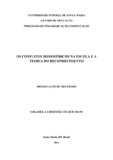| dc.creator | Dani, Grasiela Cristine Celich | |
| dc.date.accessioned | 2012-05-22 | |
| dc.date.available | 2012-05-22 | |
| dc.date.issued | 2011-09-06 | |
| dc.identifier.citation | DANI, Grasiela Cristine Celich. HOMOPHOBIC CONFLICTS IN SCHOOL, AND THE
TEORY OF RECOGNITION. 2011. 248 f. Dissertação (Mestrado em Educação) - Universidade Federal de Santa Maria, Santa Maria, 2011. | por |
| dc.identifier.uri | http://repositorio.ufsm.br/handle/1/6983 | |
| dc.description.abstract | The present dissertation talks about Homophobic conflict in school, and the theory
of recognition . It belongs to the research line Scholastic Practices and Public
Policies of the Post-Degree Program in Education of the Universidade Federal de
Santa Maria, Rio Grande do Sul. Such dissertation has as a goal to discuss in which
way the theory of recognition can contribute for the understanding and solution of
homophobic conflicts in school, among High School students. In order to achieve
such thematic propose it was chosen the interactive method, founded on the
dialectic-hermeneutical process. As a research tool, it is used the application of a
questionnaire to collect the opinion of High School students concerning
homoaffection, prejudice, homophobia, as well as the recognition of the
homosexuals, with the intention of solving the homophobic conflicts. It s important
to mention that the results of the research are evaluated taking in consideration a
qualitative and quantitative approach. In the data analyses, it is possible to ascertain
how the homophobia is formed. Based on that, it is shown ways of how the
scholastic homophobic conflict can be worked and confronted, with the intention of
comprehending and solving it. Thus, it is possible to conclude the dissertation with
a positive response when it comes to the attempt of solving homophobic conflicts in
school. Such attempt is possible through the theory of recognition of Hegel (2008)
and Honneth (2009). | eng |
| dc.description.sponsorship | Coordenação de Aperfeiçoamento de Pessoal de Nível Superior | |
| dc.format | application/pdf | por |
| dc.language | por | por |
| dc.publisher | Universidade Federal de Santa Maria | por |
| dc.rights | Acesso Aberto | por |
| dc.subject | Homoafetividade | por |
| dc.subject | Conflitos homofóbicos | por |
| dc.subject | Reconhecimento | por |
| dc.subject | Educação | por |
| dc.subject | Direitos | por |
| dc.subject | Homo-affection | eng |
| dc.subject | Homophobic conflicts | eng |
| dc.subject | Recognition | eng |
| dc.subject | Education | eng |
| dc.subject | Rights | eng |
| dc.title | Os conflitos homofóbicos na escola e a teoria do reconhecimento | por |
| dc.title.alternative | Homophobic conflicts in school, and the
teory of recognition | eng |
| dc.type | Dissertação | por |
| dc.description.resumo | A presente dissertação trata acerca dos Conflitos homofóbicos na escola, e a teoria
do reconhecimento . Pertence à linha de pesquisa Práticas Escolares e Políticas
Públicas do Programa de Pós-Graduação em Educação da Universidade Federal de
Santa Maria, Rio Grande do Sul. Tal dissertação tem por objetivo discutir de que
modo a teoria do reconhecimento pode contribuir para compreender e solucionar os
conflitos homofóbicos na escola, entre alunos do Ensino Médio. Para alcançar tal
proposta temática, optou-se pelo método interativo, fundado no processo dialéticohermenêutico.
Como instrumento de pesquisa, tem-se a aplicação de um
questionário para coletar a opinião dos estudantes do Ensino Médio acerca da
homoafetividade, do preconceito, da homofobia, bem como sobre o reconhecimento
dos homossexuais, com o intuito de solucionar os conflitos homofóbicos. Cabe
mencionar que os resultados da pesquisa são avaliados tomando por base uma
abordagem qualitativa e quantitativa. Na análise dos dados, é possível verificar
como a homofobia se forma. Com base nisso, é mostrada maneiras de como o
conflito homofóbico escolar pode ser trabalhado e enfrentado, com o intuito de
compreendê-lo e solucioná-lo. Sendo assim, conclui-se a dissertação com uma
resposta positiva ao que tange à tentativa de solucionar os conflitos homofóbicos na
escola. Tal tentativa é possível pela teoria do reconhecimento de Hegel (2008) e
Honneth (2009). | por |
| dc.contributor.advisor1 | Cunha, Jorge Luiz da | |
| dc.contributor.advisor1Lattes | http://lattes.cnpq.br/7227767555433465 | por |
| dc.contributor.referee1 | Spengler, Fabiana Marion | |
| dc.contributor.referee1Lattes | http://lattes.cnpq.br/8254613355102364 | por |
| dc.contributor.referee2 | Tomazetti, Elisete Medianeira | |
| dc.contributor.referee2Lattes | http://lattes.cnpq.br/3942924352722374 | por |
| dc.contributor.referee3 | Trevisan, Amarildo Luiz | |
| dc.contributor.referee3Lattes | http://lattes.cnpq.br/2534601801498544 | por |
| dc.creator.Lattes | http://lattes.cnpq.br/3694941267280139 | por |
| dc.publisher.country | BR | por |
| dc.publisher.department | Educação | por |
| dc.publisher.initials | UFSM | por |
| dc.publisher.program | Programa de Pós-Graduação em Educação | por |
| dc.subject.cnpq | CNPQ::CIENCIAS HUMANAS::EDUCACAO | por |


